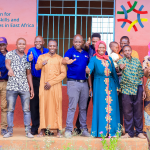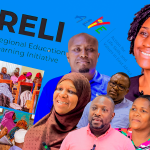Tanzania has ratified all important international treaties on the prevention of child labour and has continued to implement programmes to withdraw children from such harsh circumstances. With the help of various stakeholders – such as non-governmental organizations and civil society organizations – existing laws and policies have been reformed to provide better rights and well-being.
However, gaps in labour law and criminal law enforcement remain challenging in child labour. According to national statistics, 29.3% of all children aged 5-14 in Tanzania are engaged in child labour in various economic sectors, including agriculture, domestic work, fishing, and mining.
Moreover, 24.6% of working children aged 7-14 are in work and in school. Agriculture is the main sector in which children work most, especially in tobacco crops, which accounts for 94.1% of all child labour. Children are also engaged in many types of employment such as mining, (carrying and knocking stone or aggregate) and domestic work.
Agriculture is the leading economic sector in the Tabora Region, with 81.5% of households, according to the 2012 census. 64% of Tabora’s population is engaged in tobacco agriculture as the main commercial crop in the region, contributing significantly to the household economy and country as whole.
The literacy rate has lowered to 59% in Tanzania in the past few years. The highest proportion of people who have never been to school are found in the Tabora Region, which has 42% of women and 34% of men.
The ECLT Foundation carried out a preliminary study through the “PROSPER” project, which was implemented in the Tabora Region from 2011 to 2015. Initial results showed that the overall incidence of child labour was about 57.4% in Sikonge District and 56.4 in Urambo District, where children in child labour in tobacco growing at the time was 24.2% and 21.6%, respectively.
Geofrey Damson, a resident of Sikonge District in Tabora region, talked about the situation he experienced during his childhood in his family: “I started working in tobacco at the age of five. By the time I was eight, I knew how to work and started cutting the logs of drying tobacco. During the tobacco crop farming season, you did not even attend school, because the whole family is in the field.”, said Damson.
Damson says the PROSPER programme to eliminate child labour in tobacco-growing areas, implemented by the “Tanzania Development Foundation” (TDFT) and the “Tanzania Association of Women Leaders in Agriculture and Environment” (TAWLAE), and funded by the ECLT Foundation, not only provided education on the effects of child labour but also provided training on gardening, poultry farming and bees to young people, parents, or guardians. After the successful implementation of this training programme, Damson now has 100 hives, and his life has changed by increasing his income.
Child labour in tobacco-growing communities is caused by a number of factors, including the separation of the family, harsh circumstances of life in the family (low income that does not meet the basic daily needs), death of parent, and tradition and customs for some tribes.
Norbat Silwamba, a resident of Gua ward in Songwe District and one of the beneficiaries of the “PROSPER RESET” project, says: “We used to spend a lot of time engaging with our families to improve our finances, regardless of the potential impact on children. Sometimes children were suffering from an incomprehensible disease. Parents spent a lot of time in the hospital as well. But now, after being educated on the topic of child labour at a young age, the practice is over and children are attending school”.
In addition, Urambo District Director Mr. Baraka Zikatimu said: “We have a committee called NPA-VAWC – enabled by the “PROSPER RESET” project implemented by TDFT and TAWLAE – to monitor the issues of violence and child labour on their tobacco farms. We are now seeing children not dropping out of school. Attendance in classrooms has actually increased, whereas four years ago, the situation was not good enough. As a result, many children were unable to succeed and progress to secondary school.
But now we see that the children’s livelihood has improved. We believe that Urambo District will be one of the most successful districts in terms of development, as we will have eliminated child labour and violence in these groups of children and mothers as well.”
To get a reality about the attendance of the students at the school, we talked to Genovena Mwanakulya, a teacher at Mtanila Primary School in the Chunya District of Mbeya Region. She said that there was initially a big problem because, as soon as the tobacco farming season starts, parents are willing to pay a fine for not sending their children to school, as they rather have the children working in the farm. Therefore, a class of 50 students would decrease to only 30 students per day. With the help of the NPA VAWC committee, the community began to understand the impact of child labour and the consequences of school absence. Since then, the gap has decreased in schools, while children performance has increased.
“Alliance One Tobacco Tanzania Ltd.”, which is involved in the purchase of tobacco, supports the farming community in partnership with “TDFT” through the “PROSPER RESET” project to combat child labour and violence in tobacco farms by providing education to prevent such acts, as well as creating savings and loans groups for the parents.
The ALP Coordinator in Tanzania, Mr. Laurence Safari, said: “Many farmers have a low income especially when it comes to harvest season. They don’t necessarily have the money to pay workers, so they ask their families, including children, to go and do tobacco harvesting work. Being aware of this reality, we formed savings and loans groups to help them to save and borrow money to pay staff and let the children go to school and not be used for tobacco harvesting and preparation activities.”
The Director of the TDFT, Mr. Dick Mlimuka, said: “Projects that help to remove children from young age employment in regions whose residents are engaged in tobacco production have started since 2011, including the “PROSPER” project, especially in Tabora, which is the hub of the crop in Tanzania. At that time, child labour in tobacco fields was 90 % higher than today. The situation has dramatically improved in terms of education that has been provided to the community, especially to farmers from tobacco crops.
Finally, Mr. Dick Mlimuka thanked the sponsors of the “PROSPER RESET” project, the ECLT Foundation in Geneva, for helping the Tanzanian government to fight child labour in the country. He also called on communities, governments and various stakeholders to continue to advocate against the use of any kind of child labour. In the run-up to the celebration of the World Day Against child labour on June 12, there is a need to continue to engage the entire community of tobacco farmers about child labour.
By, John Kabambala





